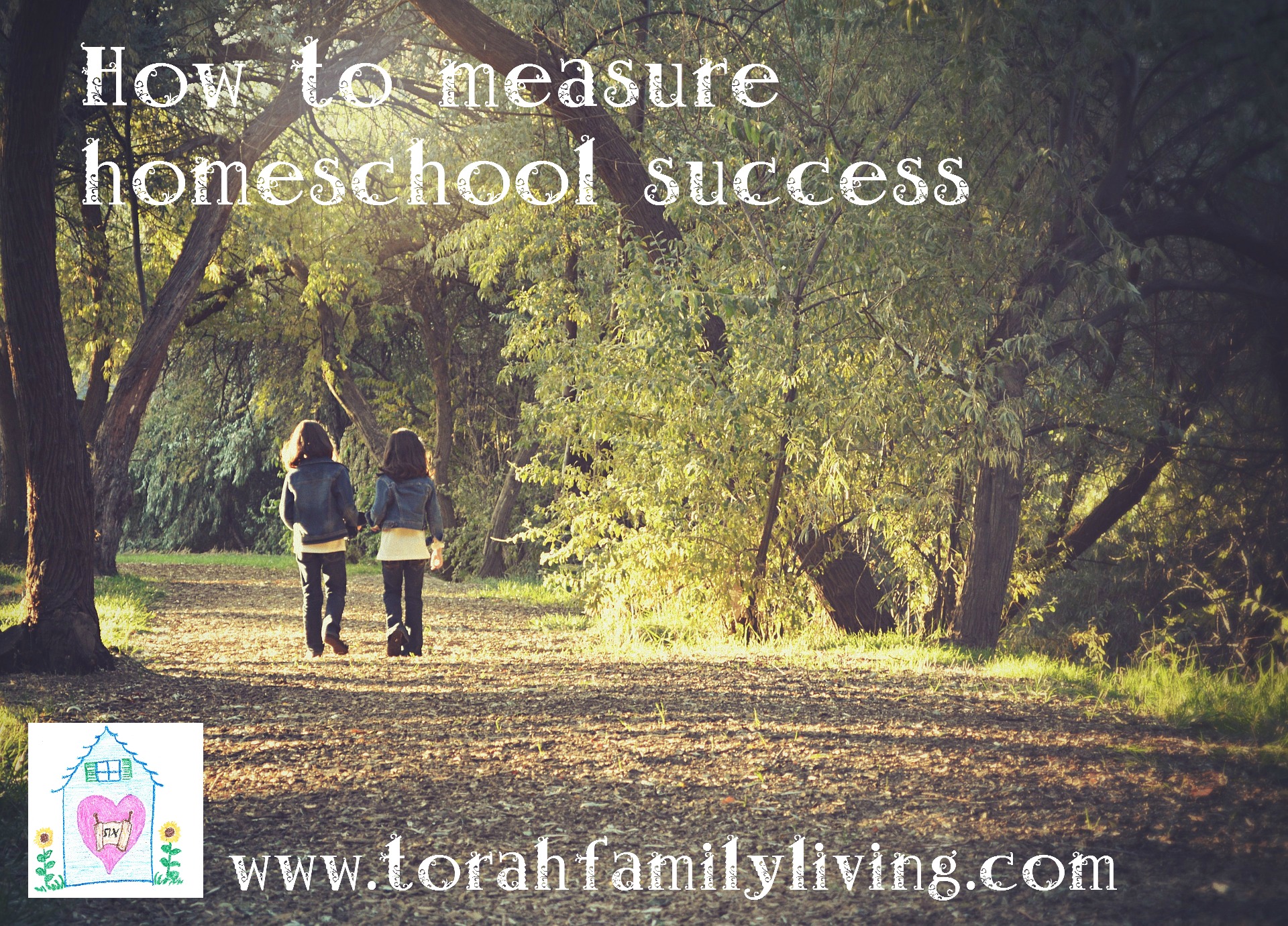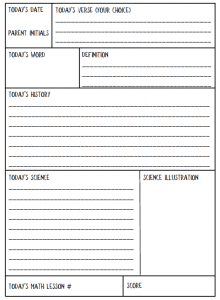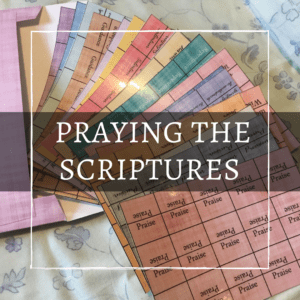
We can all agree that we want to be successful as homeschool families. We want to know that our investment in our children’s lives has paid off. We want to know that we are on the right track in our endeavor to prepare our children for adulthood. While success will look different in every family, I think there are some measures that we can use to see how we are doing.
I have put together 12 questions for you to ponder. You may find that in some areas your family is doing quite well. Other areas, on the other hand, may still need some serious attention. How do you think your family is doing?
Are my children becoming more grounded in Torah, and the rest of Scripture?
At the end of the day, this is the critical thing that will enable our children to navigate through life. They need to know what Scripture teaches, and how to live it out in everyday life. I list Torah first, because the first five books of the Bible provide a solid foundation for everything else we find in Scripture. We need to understand how everything began, how YHVH brought his people out of Egypt, and His instructions for living.
But we don’t want to park there. The rest of Scripture helps us to better understand Torah. Most of the Old Testament provides the full history of Israel. The Psalms and Proverbs give us the raw, emotional side of Torah keeping, and help us to be honest with ourselves on this journey. The New Testament gives us the full account of our Messiah, Yeshua. Without Him, we really only have half the picture. As we work through the rest of the New Testament, we are given all we need to take us till Yeshua returns.
Are your children being taught all of Scripture? Have you taught one part faithfully and neglected another? If you are not satisfied with your answer to this question, I would park here and not worry about the other questions. Yes, it’s that important.
Here are some resources to help you.
Torah family living copywork books
Do my children have interests that they have opportunity and desire to pursue?
Homeschooling should not be limited to bookwork. What topics do your children talk about? What do they enjoy doing in their free time? Find out what their interests are and enable them to pursue them. For example, my oldest daughter enjoys ducks. I got her some ducklings and a book, and she is now our resident expert. She has successfully hatched her own eggs, raised several flocks, and is now venturing into geese. She has discovered what websites to visit when she needs help, and is now connecting with another homeschool girl who is raising ducks as well.
This experience will serve her well in the future. She has learned some valuable skills, including research, hard work, and consistency. The best part is, since this was her passion, I only had to keep up with her. I never had to remind her to care for her ducks.
Do your children have something that they are passionate about that they can be given room to pursue? They will learn much in the process.
Are my children curious and imaginative?
Some people would refer to this concept as raising life-long learners. A child that is curious and imaginative becomes an adult that can solve problems, find better ways of doing things, create plenty of spice for a rich life, etc.
Do your children ask questions? Do they explore in their backyard? Do they enjoy making up little stories and engaging in pretend play? My older children play Minecraft, and while I’m not a huge fan of videogames, I have been impressed with the structures, boats and animals they build, and the plots behind them. My younger children have a huge collection of beanie babies, and they play with them for hours, making up stories, and making houses out of cardboard boxes.
Leave room in your schedule for your children to play. Let them explore and create. Keep their imaginations active. A surprising way to do this is to let them get bored. A bored child will quickly become an imaginative child. How are your children doing in this category? If you feel they aren’t where they should be, try removing a large number of their toys, and sending them outside with nothing to do. They’ll figure out the rest.

Do my children have basic academic skills?
In order to succeed at anything in life, our children need to be able to read well, and do math well. So much is built on these two skills, so you don’t want to fall short here. When my children are first entering school grades, these two subjects make up the bulk of their official schoolwork. They do a reading and math lesson everyday. Science and history are learned as we read a book together or watch a nature show on TV. Even taking a stroll and learning about the flowers is appropriate science for this age. But their school time is reserved for mastering reading, and getting a solid foundation in math.
How are your children doing in these two areas? I don’t want you to compare by age alone. I have had children that learned to read relatively easily, and another that didn’t learn to read until she was nine. What I want you to look for is growth. Are they moving forward? Are they mastering skills? If you feel they are struggling, consider pausing other subjects temporarily and focusing on these basic skills. My late reader was helped by PhonicsTutor. My daughter was struggling in math and found Teaching Textbooks very helpful.
Can my children conduct research?
Everything I learned since high school was self taught. I know how to research and learn, so I have taught myself many skills, from spinning yarn to writing html code. In fact, this website was built by my two hands from the ground up. I’m not saying this to brag, but to demonstrate that if your child can research and find information, there is nothing that can get in their way. You no longer have to worry if you taught them everything. If you missed something, and they need to know it, they will have the ability to find out.
The easiest way to teach your child how to research is to turn them loose on a subject that interests them. (See the question above.) If they want to know something, you won’t have to give them any assignments. They will probably be bugging you on where they should go (library, internet with parental guidance, books you own, etc.) to find the info.
Do my children have an effective means of communication?
There are different ways to communicate, and your child does not need to be well versed in all of them. But they do need to have at least one way to communicate their thoughts and ideas to others. Some people are more natural at speaking. Others, like myself, are more comfortable with writing. My daughter loves artwork. I suggest that you have your child learn different forms of communicating, so that they are able when the need arises. They will also find where they shine.
Do my children enjoy being with their family?
One of the benefits of homeschooling is the ability to be close knit as a family. If this isn’t happening, then something is amiss. Are you spending too much time outside of the house? Is your time at home spent in different rooms? Has sibling rivalry been allowed to take root?
I’m not going to try to give you specific answers to these problems here. I struggle with some of them myself. But I do want to encourage you to investigate further and do what you can to encourage a closer family. This may not be academic, but it is so important, both now, and in your children’s future homes.
Do my children have relational skills?
This is closely related to the previous question, but I want to get a bit more specific here.
- Do your children know how to apologize?
- Can they meet and make friends?
- Do they have basic manners?
- Do they know how to resolve a conflict with someone they love?
- Can they carry on a two-sided conversation?
- Have they developed good habits, like prompt chore completion?
- Do they show respect for those older than them, by giving up their chair, etc?

Do I still have a thirst for knowledge?
Your children will follow your example. Do they see you reading books? Do you share with them things you have learned? Do you show excitement when you learn something new alongside your children? Do you have your own hobby or interest to pursue when time allows? If you are still learning, it’s pretty likely that your children have a thirst for knowledge, too.
My father in law used to say, “The day you stop learning is the day you die.”
Am I able to put a smile on my face and set the tone for the day?
It’s a sobering moment when you realize that you are the mom, and should be acting like an adult. Hopefully, your days of throwing fits, whining, and complaining are in the past. They probably aren’t entirely, but you should be able to put a smile on your face whether or not you feel like it. Here’s a short quote from my book, “It’s Okay to Hide in the Bathroom.”
It’s funny how we like to be miserable and frown. We want to feel sorry for ourselves because our life is so difficult. We are so misunderstood. Our house is always a mess. Our kids are always crying. Our husband never helps us out. So we walk around with a scowl and a frown.
Smiling can be done very quickly, and is a very effective way to improve the entire atmosphere in your home. Smiling is like yawns. It’s highly contagious. If you smile, it won’t take long before your kids can’t help but smile.Then you won’t have to feel so sorry for yourself because your kids are always crying. (Funny how that works, huh?) Even smiling at a complete stranger in the grocery store can be an incredibly powerful thing. Try it. Just smile for no reason and see what happens.
Your children will learn more from watching you than they will from your lessons. Give them the example of a cheerful countenance.
Do I model a relationship with YHVH, or rule-keeping?
We’ve talked about how our children need to know their Bibles. But we don’t want it to stay in their heads. We want them to have a relationship with YHVH, not just a list of rules to live by. I want you to evaluate how you are presenting your faith. Yes, you need to teach your children right and wrong. But, do your children see you reading your Bible? Are you sharing personal insights from your own Bible study? Are you praying and acknowledging answered prayer? Do you refer to YHVH as not only Adonai (master) but also Abba (daddy).
For your faith to be passed on to the next generation, it needs to become more than rules for them. You can’t wave a magic wand to make this happen, but you can show them your personal relationship with YHVH.
Does my family ask questions, especially spiritual?
I remember reading an article, and unfortunately don’t remember where, about how to guage where our children are spiritually. It was very simple. Do our children ask questions about spiritual things? Do they, on their own, seek to learn more about YHVH and His ways? If it’s true for our children, then it’s definitely true for us.
Are you, as a family, asking questions? How can we keep Passover better this year? Where do we need to repent? How do we see Yeshua our Messiah in this passage? If you are all actively seeking to learn more as a family and as individuals, then you are right where you want to be. If you have lost interest, or feel that you already know what you need to know, then please ask YHVH to give you a fresh thirst for Him and His ways. He rewards those that diligently seek Him.
How did your family measure up?
This is by no means a complete list, but I hope it will reassure you in some areas, and show you where there is still room for improvement. I know I have some things to work on in my family. If you feel brave, share with us your thoughts on where your family is in the comments.

While we are talking about measuring homeschool success, I have a brand new freebie for you! I have put together a simple daily printable for your child to use. It has space for each subject, to either give a short written summary, or draw a picture, or give a lesson score etc. If used faithfully, you will have a very easy time doing grades when needed. I have a printable for older children, and one for those not quite ready to give written feedback. Just click below to get your copy.
Next post in the series: Consistency versus perfection
Save
Save














One Response